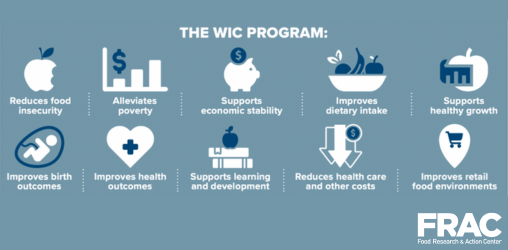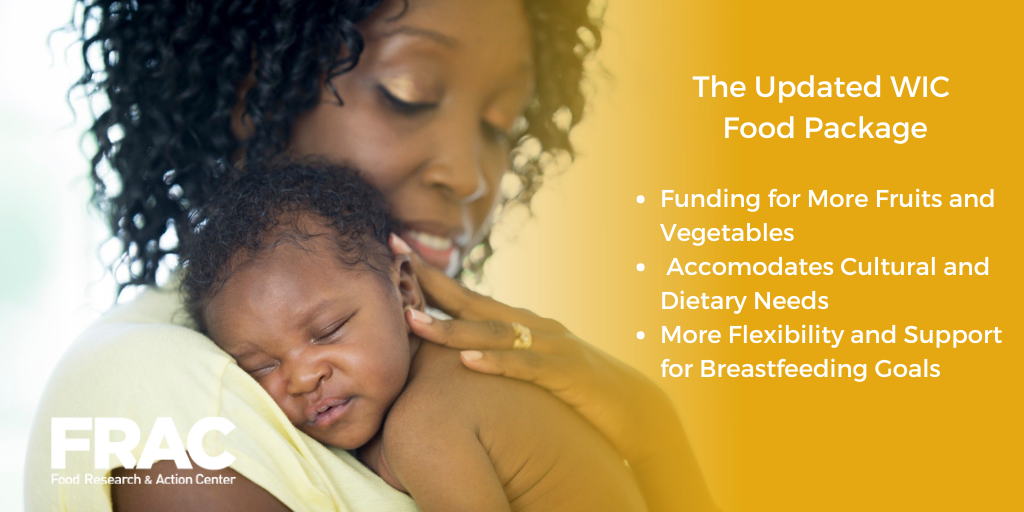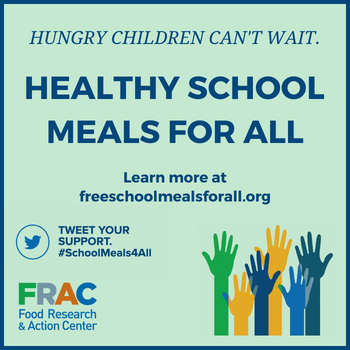
Urge Your Members of Congress to Support Modernizing WIC
Ask your Members of Congress to cosponsor the 21st Century WIC Act (S. 3842) or the More Options to Develop and Enhance Remote Nutrition (MODERN) WIC Act (H.R. 1464). These bipartisan bills create permanent options for remote enrollment, services, and benefits issuance for the Special Supplemental Nutrition Program for Women, Infants, and Children (WIC). Without Congressional action, these essential modernizations, which reduce barriers to WIC, could expire in September 2026.

Protect SNAP: Legislative Priorities
Cuts to SNAP threaten the child nutrition programs. Protecting SNAP is protecting America’s health, economy, and future.
Congress must take immediate action to ensure the Farm Bill — or any legislation — reverses the devastating cuts and harmful impacts on SNAP that were included in the budget reconciliation law (H.R. 1). Discover FRAC’s legislative priorities in this new one-pager.

The WIC Program: Improving Maternal and Child Health and Fighting Hunger
The Special Supplemental Nutrition Program for Women, Infants, and Children (WIC) provides pregnant, postpartum, and breastfeeding individuals, infants, and children up to 5 years of age from households with low incomes with nutritious foods, nutrition education and counseling, breastfeeding support, and referrals to health care and social services. Learn more about WIC’s impact in FRAC’s fact sheet.

Connecting Families to WIC: A Practical Toolkit for Health Care Providers
Developed by Kimberly Montez, MD, MPH, FAAP, and Kofi Essel, MD, MPH, FAAP, in partnership with FRAC, Connecting Families to WIC: A Practical Toolkit for Health Care Providers, is designed to help health care professionals more effectively identify and address gaps in participation in the Special Supplemental Nutrition Program for Women, Infants, and Children (WIC).

WIC Program FRAC Facts
The Special Supplemental Nutrition Program for Women, Infants, and Children (WIC), a federal nutrition program, is widely recognized as an important safeguard for protecting and improving the health and nutrition of pregnant, postpartum, and breastfeeding individuals, infants, and children up to 5 years of age from households with low incomes.
Poor nutrition, poverty, and food insecurity have detrimental impacts on infant, child, and maternal health and well-being in the short and long terms. One critical strategy to address these issues is connecting vulnerable families to the life-saving benefits of WIC.
WIC: A Powerful, Evidence-Based Nutrition and Health Program
The Special Supplemental Nutrition Program for Women, Infants, and Children — known as WIC — connects eligible individuals (including infants, children up to 5 years old, and pregnant and postpartum individuals) to essential nutrition resources and support, including healthy foods, nutrition education, breastfeeding support, and healthcare referrals.
Research shows that WIC is a vital economic, nutrition, and health support for children and families.
Nearly 40 percent of all infants born in the U.S. benefit from WIC.


Updated WIC Food Packages
The U.S. Department of Agriculture (USDA) issued a final rule in April 2024 revising the food packages for WIC. The updated food packages will have a longstanding positive impact on program participation, health outcomes for WIC participants, and addressing health disparities. The rule announced by USDA marks a critical step toward equitable access to nutritious food by improving the nutritional quality of the foods offered, making WIC more client-centered, and increasing the value of the program’s food package.
Spread the word about these important updates with FRAC’s toolkit (English and Spanish) and customizable graphics. Read more in FRAC’s statement.

- Learn More: WIC Resources
- WIC Basics
- WIC Participation Data
- Strategies for Connecting Families to WIC
- Get Engaged

